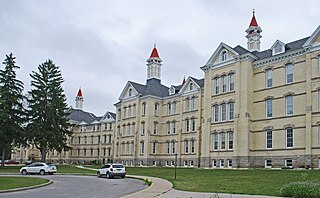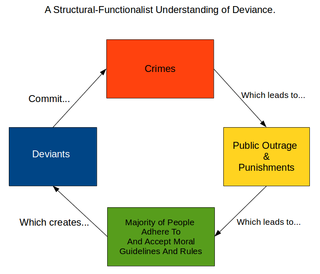
The Diagnostic and Statistical Manual of Mental Disorders is a publication by the American Psychiatric Association (APA) for the classification of mental disorders using a common language and standard criteria.

Psychiatric hospitals, also known as mental health hospitals, and mental health units, are hospitals or wards specializing in the treatment of serious mental disorders, such as major depressive disorder, schizophrenia and bipolar disorder. Psychiatric hospitals vary widely in their size and grading. Some hospitals may specialize only in short term or outpatient therapy for low-risk patients. Others may specialize in the temporary or permanent care of residents who, as a result of a psychological disorder, require routine assistance, treatment, or a specialized and controlled environment. Patients are often admitted on a voluntary basis, but people whom psychiatrists believe may pose a significant danger to themselves or others may be subject to involuntary commitment and involuntary treatment. Psychiatric hospitals may also be referred to as psychiatric wards or units when they are a subunit of a regular hospital.

Forensic psychiatry is a subspeciality of psychiatry and is related to criminology. It encompasses the interface between law and psychiatry. According to the American Academy of Psychiatry and the Law, it is defined as "a subspecialty of psychiatry in which scientific and clinical expertise is applied in legal contexts involving civil, criminal, correctional, regulatory, or legislative matters, and in specialized clinical consultations in areas such as risk assessment or employment." A forensic psychiatrist provides services – such as determination of competency to stand trial – to a court of law to facilitate the adjudicative process and provide treatment, such as medications and psychotherapy, to criminals.
Social psychiatry is a branch of psychiatry that focuses on the interpersonal and cultural context of mental disorder and mental wellbeing. It involves a sometimes disparate set of theories and approaches, with work stretching from epidemiological survey research on the one hand, to an indistinct boundary with individual or group psychotherapy on the other. Social psychiatry combines a medical training and perspective with fields such as social anthropology, social psychology, cultural psychiatry, sociology and other disciplines relating to mental distress and disorder. Social psychiatry has been particularly associated with the development of therapeutic communities, and to highlighting the effect of socioeconomic factors on mental illness. Social psychiatry can be contrasted with biopsychiatry, with the latter focused on genetics, brain neurochemistry and medication. Social psychiatry was the dominant form of psychiatry for periods of the 20th century but is currently less visible than biopsychiatry.
Child and Adolescent Mental Health Services (CAMHS) is the name for NHS-provided services in the United Kingdom for children, generally until school-leaving age, who are having difficulties with their emotional or behavioural well-being. CAMHS are organised locally, and the exact services provided may vary, often by local government area.
A mental health professional is a health care practitioner or social and human services provider who offers services for the purpose of improving an individual's mental health or to treat mental disorders. This broad category was developed as a name for community personnel who worked in the new community mental health agencies begun in the 1970s to assist individuals moving from state hospitals, to prevent admissions, and to provide support in homes, jobs, education, and community. These individuals were the forefront brigade to develop the community programs, which today may be referred to by names such as supported housing, psychiatric rehabilitation, supported or transitional employment, sheltered workshops, supported education, daily living skills, affirmative industries, dual diagnosis treatment, individual and family psychoeducation, adult day care, foster care, family services and mental health counseling.
The psychiatric survivors movement is a diverse association of individuals who either currently access mental health services, or who are survivors of interventions by psychiatry, or who are ex-patients of mental health services.
Psychiatric rehabilitation, also known as psych social rehabilitation, and sometimes simplified to psych rehab by providers, is the process of restoration of community functioning and well-being of an individual diagnosed in mental health or emotional disorder and who may be considered to have a psychiatric disability.
The recovery model, recovery approach or psychological recovery is an approach to mental disorder or substance dependence that emphasizes and supports a person's potential for recovery. Recovery is generally seen in this model as a personal journey rather than a set outcome, and one that may involve developing hope, a secure base and sense of self, supportive relationships, empowerment, social inclusion, coping skills, and meaning. Recovery sees symptoms as a continuum of the norm rather than an aberration and rejects sane-insane dichotomy.
Loren Richard Mosher was an American psychiatrist, clinical professor of psychiatry, expert on schizophrenia and the chief of the Center for Studies of Schizophrenia in the National Institute of Mental Health (1968–1980). Mosher spent his professional career advocating for humane and effective treatment for people diagnosed as having schizophrenia and was instrumental in developing an innovative, residential, home-like, non-hospital, non-drug treatment model for newly identified acutely psychotic persons.
Nick (Nicandros) Bouras is a Greek professor (emeritus) of psychiatry at the Institute of Psychiatry, Psychology and Neuroscience King's College London, United Kingdom. and Programme Director of Maudsley International that promotes developments in mental health around the world.
Carl Compton Bell was an American professor of psychiatry and public health at the University of Illinois at Chicago. Bell was a National Institute of Mental Health international researcher, an author of more than 575 books, chapters, and articles addressing issues of violence prevention, HIV prevention, isolated sleep paralysis, misdiagnosis of Manic depressive illness, and children exposed to violence.
The National Empowerment Center (NEC) is an advocacy and peer-support organization in the United States that promotes an empowerment-based recovery model of mental disorders. It is run by consumers/survivors/ex-patients "in recovery" and is located in Lawrence, Massachusetts in Essex County.
Psychiatry is the medical specialty devoted to the diagnosis, prevention, and treatment of mental disorders. These include various maladaptations related to mood, behaviour, cognition, and perceptions. See glossary of psychiatry.
The Critical Psychiatry Network (CPN) is a psychiatric organization based in the United Kingdom. It was created by a group of British psychiatrists who met in Bradford, England in January 1999 in response to proposals by the British government to amend the 1983 Mental Health Act (MHA). They expressed concern about the implications of the proposed changes for human rights and the civil liberties of people with mental health illness. Most people associated with the group are practicing consultant psychiatrists in the United Kingdom's National Health Service (NHS), among them Dr Joanna Moncrieff. A number of non-consultant grade and trainee psychiatrists are also involved in the network.

The Association of Mental Health Providers, known until May 2017 as Mental Health Providers Forum (MHPF), is a registered charity based in London and the representative body for voluntary and community sector mental health organisations in England and Wales, working nationally and regionally to influence practice and policy. It aims to improve the range and quality of mental health services by increasing the involvement of the voluntary sector in delivering them, working in partnership with the wider sector and government agencies. Specific projects include the promotion of innovation in the sector, evidencing best practice to achieve the best outcomes for individuals and supporting recovery.

The Royal Australian and New Zealand College of Psychiatrists (RANZCP) is the principal organisation representing the medical specialty of psychiatry in Australia and New Zealand and has responsibility for training, examining and awarding the qualification of Fellowship of the College (FRANZCP) to medical practitioners.
Addiction psychiatry is a medical subspecialty within psychiatry that focuses on the evaluation, diagnosis, and treatment of people who are suffering from one or more disorders related to addiction. This may include disorders involving legal and illegal drugs, gambling, sex, food, and other impulse control disorders. Addiction psychiatrists are substance abuse experts. Growing amounts of scientific knowledge, such as the health effects and treatments to substance abuse, have led to advancements in the field of addiction psychiatry. These advancements in understanding the neurobiology of rewarding behavior, along with federal funding, has allowed for ample opportunity for research in the discipline of addiction psychiatry. Addiction psychiatry is an expanding field, and currently there is a high demand for substance abuse experts in both the private and public sector.
The American Academy of Child and Adolescent Psychiatry (AACAP) is a 501(c)(3) non-profit professional association in the United States dedicated to facilitating psychiatric care for children and adolescents. The Academy is headquartered in Washington, D.C. Various levels of membership are available to physicians specialized in child psychiatry or pediatrics, as well as medical students interested in the field, in the United States and abroad.
The following outline is provided as an overview of and topical guide to psychiatry:




